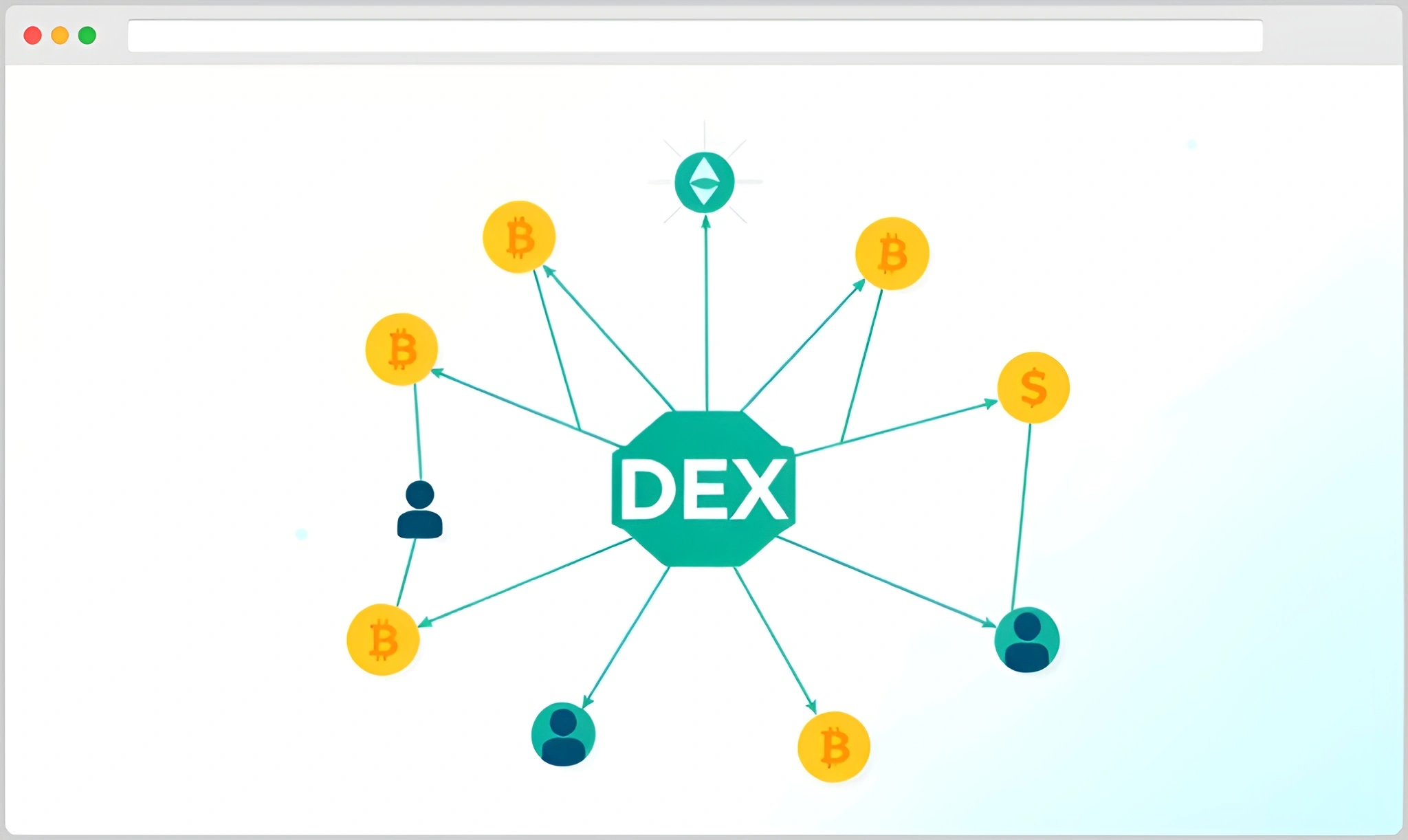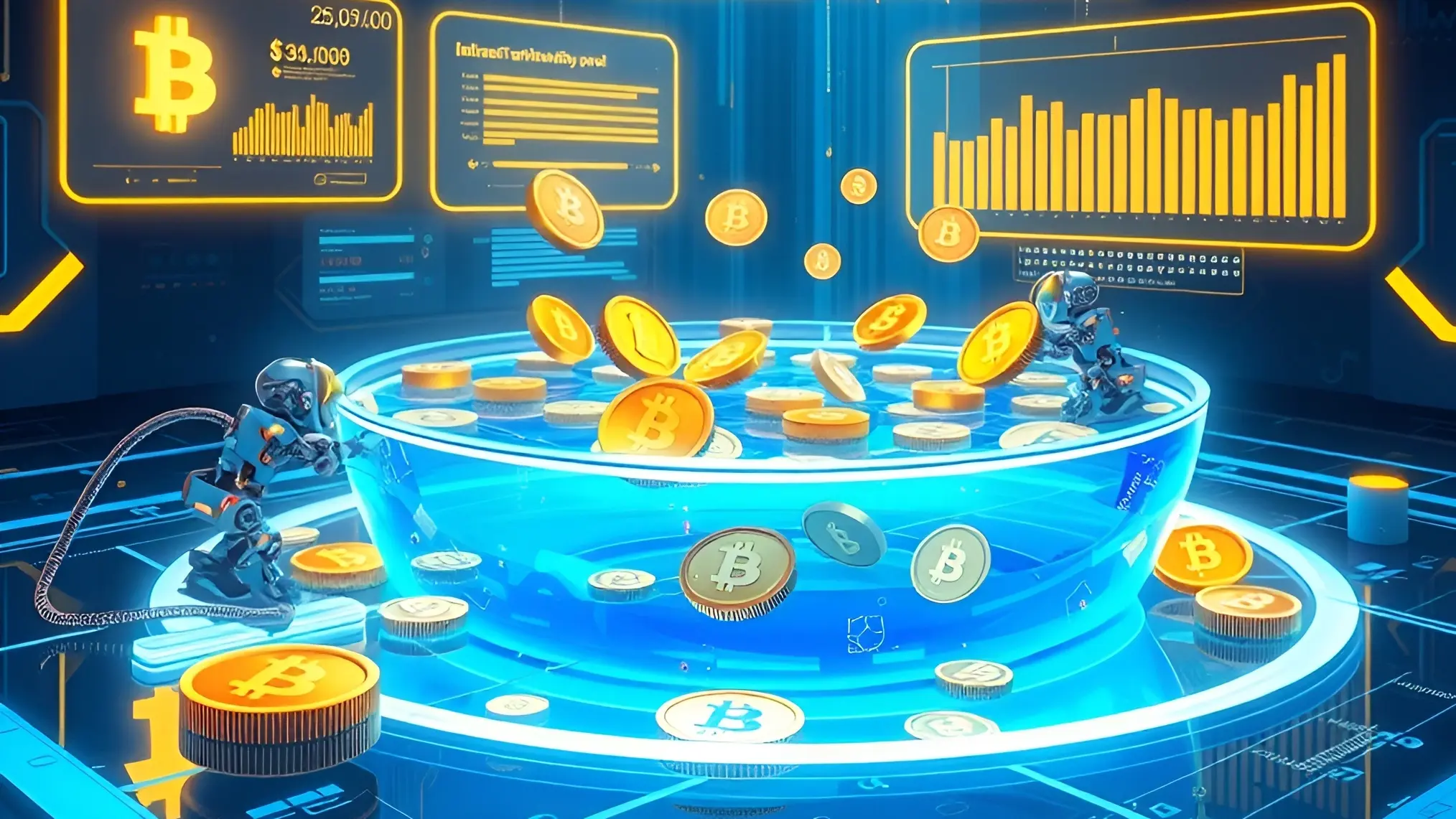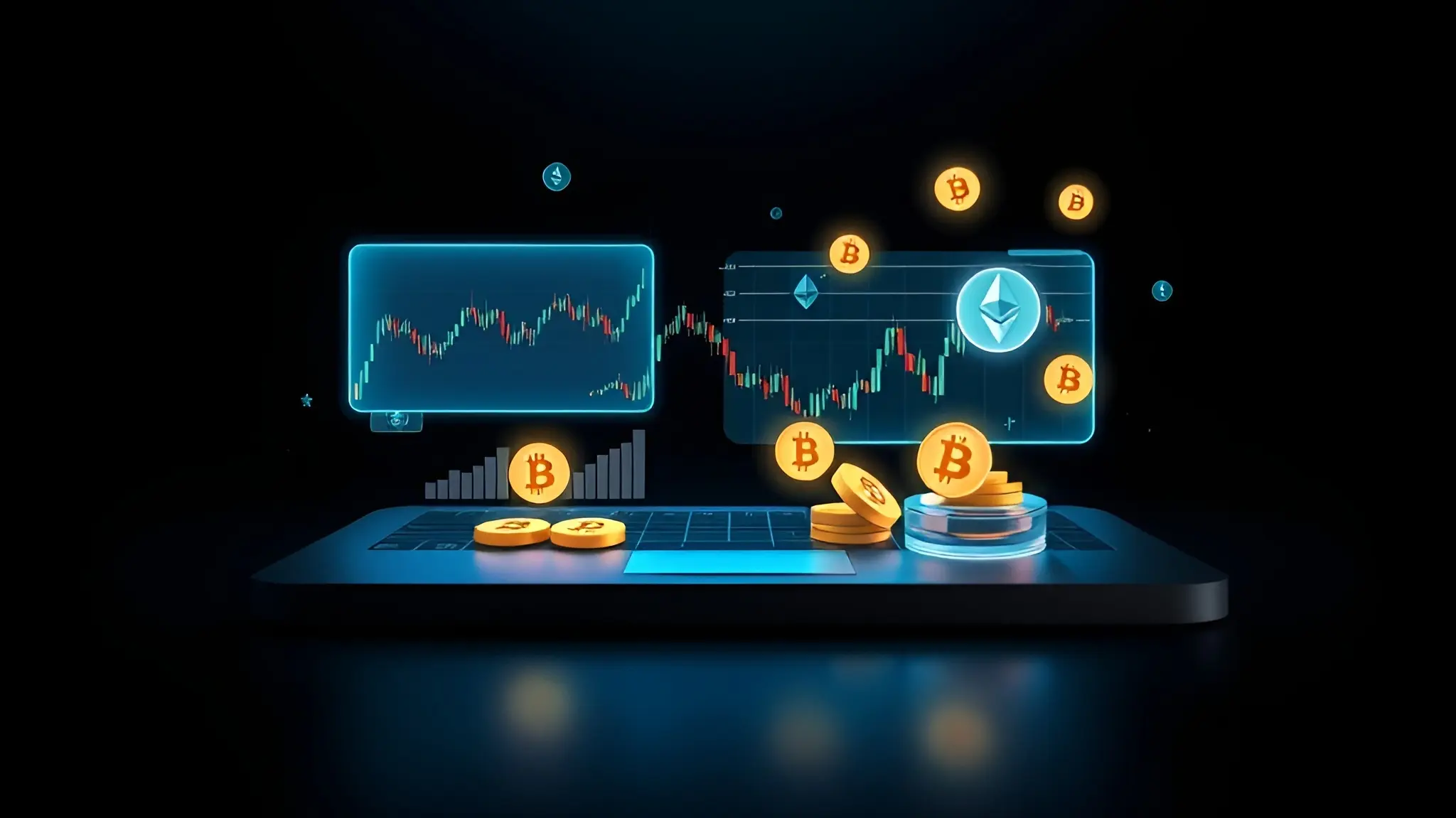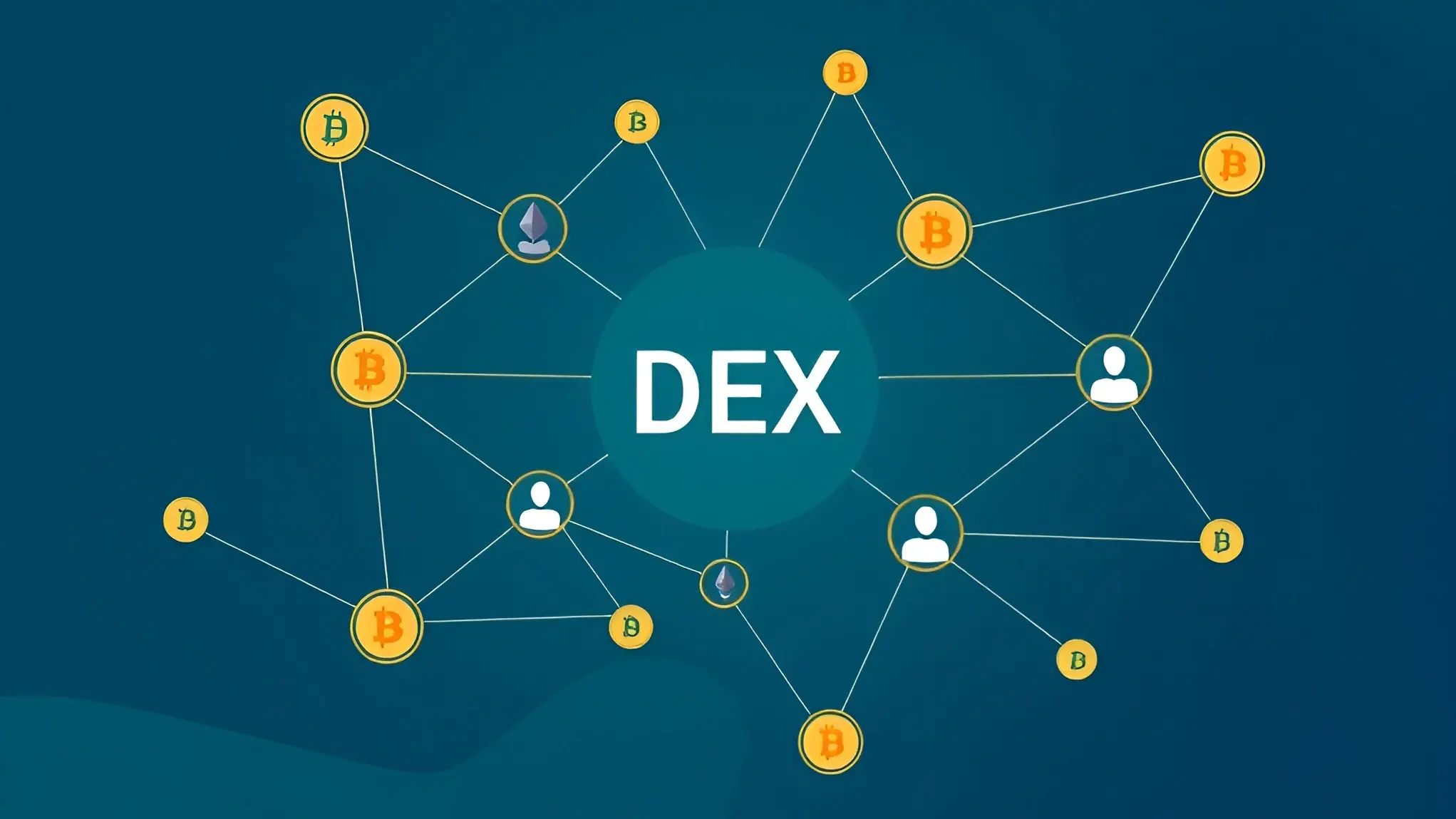What Is a Decentralized Exchange (DEX)?
A decentralized exchange (DEX) is a digital platform that allows users to trade cryptocurrencies directly with one another, without a central authority.
Instead of relying on a third party to hold funds, DEXs leverage blockchain technology and smart contracts to automate transactions.
This design gives users full control over their assets and private keys, reducing many of the security risks seen in centralized exchanges.
Key Takeaways:
ShowDefinition of a Decentralized Exchange
A decentralized exchange differs from traditional (centralized) platforms by removing the need for an intermediary to hold user funds.
Instead, smart contracts running on a blockchain coordinate trades. By interacting directly through personal wallets, users mitigate risks of hacks and fraud associated with centralized custody.
Additionally, DEXs often support an extensive selection of tokens, broadening liquidity and accessibility for traders who prioritize security and autonomy.
1. Key Features of DEXs
- Non-Custodial Trading: Users hold private keys; the exchange never takes custody
- Smart Contract Execution: Trades are governed by code
- Privacy: Many DEXs require little to no personal information
- Global Accessibility: Geographical restrictions are minimal
2. Regulatory Considerations
As decentralized trading evolves, regulators grapple with fitting DEXs into existing frameworks. Main concerns include:
- Consumer Protection: Preventing fraud and ensuring fair markets.
- AML & KYC Compliance: Tracking illicit activity, potentially conflicting with DEX privacy.
- Taxation: Clarifying rules for cross-border crypto trades and capital gains.
How DEXs Operate

1. Peer-to-Peer Transactions
On a DEX, trades happen peer-to-peer rather than through an exchange-controlled order book.
Users’ wallets communicate directly, and no deposit into a platform-controlled wallet is required. Key advantages include:
- Enhanced Security: Funds stay under user control.
- Greater Privacy: Typically minimal KYC (Know Your Customer) requirements.
- Reduced Counterparty Risk: No single entity can fail or freeze user assets.
- Global Reach: Anyone with internet access can participate.
2. Smart Contract Functionality
Smart contracts are self-executing pieces of code on the blockchain that automatically match and settle trades once certain conditions are met. This system:
- Ensures transparency (open-source code is often auditable).
- Decreases reliance on middlemen.
- Makes fraudulent alterations of trades nearly impossible, as the blockchain’s immutable ledger secures the history of transactions.
Advantages and the Disadvantages of DEXs
1. Pros of Decentralized Exchange
- Privacy & Anonymity: Fewer KYC requirements help maintain personal privacy.
- Control Over Funds: Users always manage their private keys, lowering the risk of large-scale hacks.
- Wider Token Selection: DEXs often list emerging or niche tokens not found on centralized exchanges.
- Transparency: All activity is on a public blockchain, making trades verifiable and tamper-resistant.
2. Cons of Decentralized Exchange
Despite their advantages, DEXs also come with unique challenges:
Smart Contract Vulnerabilities
- Coding Errors: Bugs in the contract can lead to exploits.
- Reentrancy Attacks: Attackers manipulate contract calls to steal funds.
- Oracle Manipulation: Inaccurate data feeds can disrupt trading outcomes.
Liquidity Risks
- Lower Trading Volume: May result in larger price slippage.
- Volatility: Rapid price changes make it harder to fill orders at expected prices.
- Impermanent Loss: Liquidity providers might see their holdings fluctuate in value due to market movements.
Regulatory Uncertainty
- Legal Liability: Some jurisdictions may restrict or penalize certain DEX operations.
- Operational Disruptions: Sudden changes in policy can force platforms to halt services.
- User Risk: If a DEX is deemed illegal or forced offline, user funds could be inaccessible.
Popular Decentralized Exchanges
Leading DEXs leverage various models and features:
- Uniswap, SushiSwap, PancakeSwap: Use Automated Market Makers (AMMs) and liquidity pools for seamless trading.
- 1inch, Balancer: Aggregate liquidity from multiple DEXs for better pricing and lower slippage.
- Cross-Chain DEXs: Allow trades across different blockchains, expanding token availability and user reach.
Liquidity in Decentralized Trading

1. Automated Market Makers (AMMs)
AMMs replace order books with smart contracts that algorithmically determine asset prices in real time. Benefits include:
- Round-the-Clock Liquidity: Traders can swap tokens anytime.
- Inclusive Liquidity Provision: Anyone can deposit assets and earn fees.
2. Liquidity Pool Dynamics
- Asset Contributions: Users deposit asset pairs, receiving fee income.
- Impermanent Loss: LPs risk losses if token prices diverge significantly.
- Security Considerations: Audited smart contracts and multi-signature solutions help safeguard funds.
Future of Decentralized Exchanges

DEXs are anticipated to grow in functionality and user adoption, driven by:
- Advanced Security: Improved smart contract auditing and upgraded blockchain protocols.
- DeFi Integration: Combining lending, staking, and advanced trading features in a single interface.
- Scalability: Layer-2 solutions and cross-chain interoperability to handle more transactions efficiently.
- Institutional Interest: As compliance measures improve, more professional investors may use DEXs.
Wrapping Up
Decentralized exchanges (DEXs) stand out for empowering users with full control of their assets, leveraging smart contracts for secure, transparent trading.
While challenges like liquidity issues, contract vulnerabilities, and regulatory ambiguity persist, the trajectory of DEXs points to continued innovation.
As they adapt to market demands and regulatory pressures, DEXs could become a central pillar of the expanding cryptocurrency and decentralized finance (DeFi) ecosystem—opening the door to new financial opportunities worldwide.
Frequently Asked Questions (FAQs)
How Do I Choose a DEX for My Trading Needs?
Look at factors like liquidity, security measures, transaction fees, supported assets, and community reviews. Confirm the DEX’s approach to contract audits and user support.
Can I Use a DEX Without Prior Crypto Experience?
Yes. Many DEXs now feature user-friendly interfaces and detailed guides. However, learning basic crypto and wallet management is essential to avoid pitfalls.
What Types of Tokens Can I Trade on a DEX?
DEXs often list a wide array of cryptocurrencies, including new and niche tokens. Verify each project’s legitimacy and smart contract safety before trading.
Are DEXs Accessible Worldwide?
Decentralization aims for global reach, but local regulations can still limit usage. Always check your region’s legal stance on cryptocurrency trading.
How Do Gas Fees Work on DEXs?
Gas fees cover the cost of executing trades on the blockchain. Fees vary depending on network congestion and can affect profitability and trade speed.

